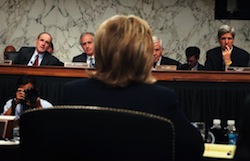Senator Corker is "Open" to Voting for New START
July 15, 2010
Featured Image
Today's top nuclear policy stories, with excerpts in bullet form.
Stories we're following today, Thursday, July 15, 2010:
Corker Has An Open Mind on New START - Josh Rogin in Foreign Policy's The Cable [link]
- Mark down Senate Foreign Relations Committee member Bob Corker, R-TN, as an undecided leaning toward supporting President Obama's nuclear-arms reductions treaty with Russia.
- Corker visited Secretary of State Hillary Clinton on Monday to talk about the treaty. Today, The Cable chased him down (literally) in the subway that connects the Capitol building to the Senate office buildings, and he said "I'm undecided but I'm very open [to supporting the treaty]."
Israeli Attack on Iran Would Start Long War: Report - Reuters [link]
- An Israeli attack on Iranian nuclear facilities would start a long war and probably not prevent Iran from eventually acquiring nuclear weapons, a think-tank said on Thursday.
- "An Israeli attack on Iran would be the start of a protracted conflict that would be unlikely to prevent the eventual acquisition of nuclear weapons by Iran and might even encourage it," it said in The Oxford Research Group's report.
- The report estimated it might take three to seven years for Iran to develop a small arsenal of nuclear weapons if it decided to do so.
- After a first strike, Israel might have to carry out regular air strikes to stop Iran developing atom bombs and medium-range missiles, the report said. "Iranian responses would also be long-term, ushering in a lengthy war with global as well as regional implications," said Paul Rogers, professor at the University of Bradford.
Even as Obama Plan Reduces Nuclear Arsenal, Spending Increases - The Los Angeles Times [link]
- A 20-year spending plan from the agency that manages the nuclear arsenal shows that the administration wants to hike nuclear weapons spending to an average of about $8 billion a year in coming years, compared to recent spending levels of $6 billion to $7 billion a year.
- The National Nuclear Security Administration plan is drawing criticism from some arms control groups, who contend the increased spending is unjustified and may prompt other world powers to doubt President Obama's pledge to reduce American reliance on nuclear weapons.
- Hans Kristensen of the Federation of American Scientists said the plan suggests that the agency is preparing to draw down the U.S. nuclear stockpile to between 3,000 to 3,500 weapons by 2021.
- In the world of nuclear weapons, there's a lot more to pay for than just warheads. The plan calls for the United States to spend $175 billion from 2010 to 2030 on new weapons production, testing and simulation facilities, and on extending the life of nuclear weapons in the arsenal.
Movie Advocates Nuclear Disarmament - The Washington Times [link]
- Lawrence Bender, who produced the climate change documentary "An Inconvenient Truth," hosted a private screening of his newest documentary Tuesday night at Gallery Place Theater in downtown Washington, D.C.
- Titled "Countdown to Zero," the new film focuses on the threat of nuclear weapons and advocates worldwide nuclear disarmament.
- The screening was co-hosted by the Center for American Progress, a liberal-leaning think tank, and Sen. John Kerry, Massachusetts Democrat, who spoke to the audience before the screening.
- "Countdown to Zero," which has been screened in Kazakhstan and before the United Nations over the past few weeks, opens to the public on July 23.
A View from the Dark Side
No New START with Russia - Robert Monroe in the Washington Times [link]
- A parade of witnesses - mostly Obama administration members, elder statesmen committed to "a world without nuclear weapons," and veteran arms controllers - have painted the treaty as another modest, responsible reduction in numbers of weapons, a new nonproliferation initiative and an important element for "resetting" our relations with Russia.
- Ratification of New START would be a major mistake, immensely damaging to national security.
- In sum, the Senate owes it to America to expand the New START ratification debate so that it fully addresses the true issue at stake - should America rely on strength or weakness as it faces the dangerous and unknown future?



